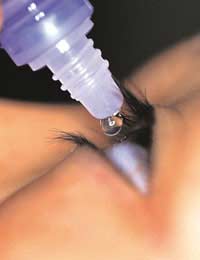Using Drops and Ointments for Your Eyes

Eye drops and ointments are generally used to treat minor eye problems or conditions. However, eye drops are also prescribed for serious eye conditions such as glaucoma. If you have glaucoma and have been advised by your optician or eye specialist to use eye drops it is imperative that you continue to use them as the condition will worsen if you stop. Always follow the advice of your optician or eye specialist when taking eye drops or ointment. They will tell you exactly how to administer the treatment how often and when to return for a check up.
Eye ointments can also be prescribed for a range of eye problems. Rather than take eye drops, some people prefer to use an eye ointment. Lubricating ointments for conditions such as dry eye, work in the same way as lubricating eye drops but are often more beneficial for treating the condition overnight.
Eye Drops for Glaucoma
Chronic glaucoma is one of the main types of the condition. For chronic glaucoma eye drops are usually prescribed to begin with. The drops will reduce the amount of liquid in the eye and improve drainage. It is imperative that patients continue to use the eye drops every day even if their vision seems good. A patient’s sight may appear normal but it could be getting worse without them noticing.According to the RNIB, many patients with glaucoma often stop taking the eye drops because they believe the glaucoma is under control. However if a patient doesn’t continue to use the eye drops their sight may become gradually worse and they could lose their sight. Once their eyesight has deteriorated it is not possible to restore it, so prevention and limiting the damage is crucial. A recent report by the RNIB found that over 200,000 people in the UK are needlessly going blind because they have glaucoma. However taking eye drops every day will prevent blindness. Over 10% of people who are registered blind or partially sighted have glaucoma.
Eye Drops for Other Eye Problems
Keratoconus is another serious eye condition which will often be treated or controlled by eye drops. If swelling develops in the eye, then drops will be prescribed to ease the symptoms but this only provides temporary relief. There are no medications to stop the condition from developing further.Eye drops may be recommended for many other eye problems such as hay fever, allergies and infections such as conjunctivitis. Most cases of conjunctivitis can be treated with eye drops. Antibiotic eye drops will be needed for infectious conjunctivitis. If the condition is caused by a virus then it can only be fought off by the body’s immune system. Eye drops will only relieve the symptoms and will not treat the condition.
If you suffer from dry eye, lubricating eye drops will help to soothe the irritation and provide immediate relief. However some eye drops contain a preservative which some people may be allergic to. If they do cause an irritation then you can get a prescription from the hospital pharmacy for a preservative free medication. There are also lubricant ointments available which are particularly helpful at night.
If your eyes are dry because you have hay fever or an allergy, lubricating eye drops are also useful to ease the symptoms. However, always seek professional advice from your optician or GP before using lubricating eye drops.
It is common to have eye drops after laser treatment or eye surgery such as cataract surgery. Drops are used to prevent infection in the eye after an operation.
- What Do Intravitreal Injections Treat?
- Types of Retinal Laser Treatment
- What is Lucentis?
- What is Ozurdex?
- Angiogenesis Inhibitors and the Eye
- Telescopic Eye Implants Help Treat Macular Degeneration
- Lasek and Lasik Eye Surgery: What is the Difference?
- What Are Intravitreal Implants?
- Photodynamic Therapy for Opthalmic Conditions
- Cataract Removal Surgery
- What a Cornea Transplant Involves
- The Pros and Cons of Laser Eye Surgery
- What is Laser Eye Surgery?


Re: What is Vitrectomy Surgery?
I had vitrectomy 4 weeks ago. The surgery was not well done as apparently bleeding occurred. The hole did not close despite having…
Re: Glasses or Contacts?
I need a eye exam and new glasses it's been since 2013/ I have no income I lost my boyfriend last September and I've been homeless ever…
Re: Eyewear for the Partially Sighted
This extract from your text is not clear and the grammar is poor- and the letters in the validation box are mixed…
Re: Eye Cancer Symptoms
I have yellow in both eyes lools like 2 dots. But looks like its makin the white part of my eye yellow whats wrong with me
Re: Are my Glasses Affecting my Eyes?
Hi, Please can anyone give advice on wearing varifocals. After a short while I develop a severe ache in my left eye and…
Re: Are my Glasses Affecting my Eyes?
On wearing my new varifocals, I am finding that my left eyeball hurts so much it feels like it will explode after 15…
Re: What is the Cause of my Itchy Eye?
I have One and only One itchy eye that has been going on 24/7 for 5 weeks.Eye is not swollen vision not affected. Eye doc…
Re: Contact Lens Trials Explained
Hi, We wanted to get in touch with you to increase traffic on your website. Please reply to this email so we can send you free…
Re: What Are Photoreceptors?
I have a 10 year old grandson who was diagnosed at apx 2 with cone and rod dystrophy eye disease. Please help with any treatment…
Re: Driving and Eyesight
Danny6520 - Your Question:Hi,I am only 16, but soon I will be 17and I am hoping to drive. However I have a few problems. Firstly, I am…